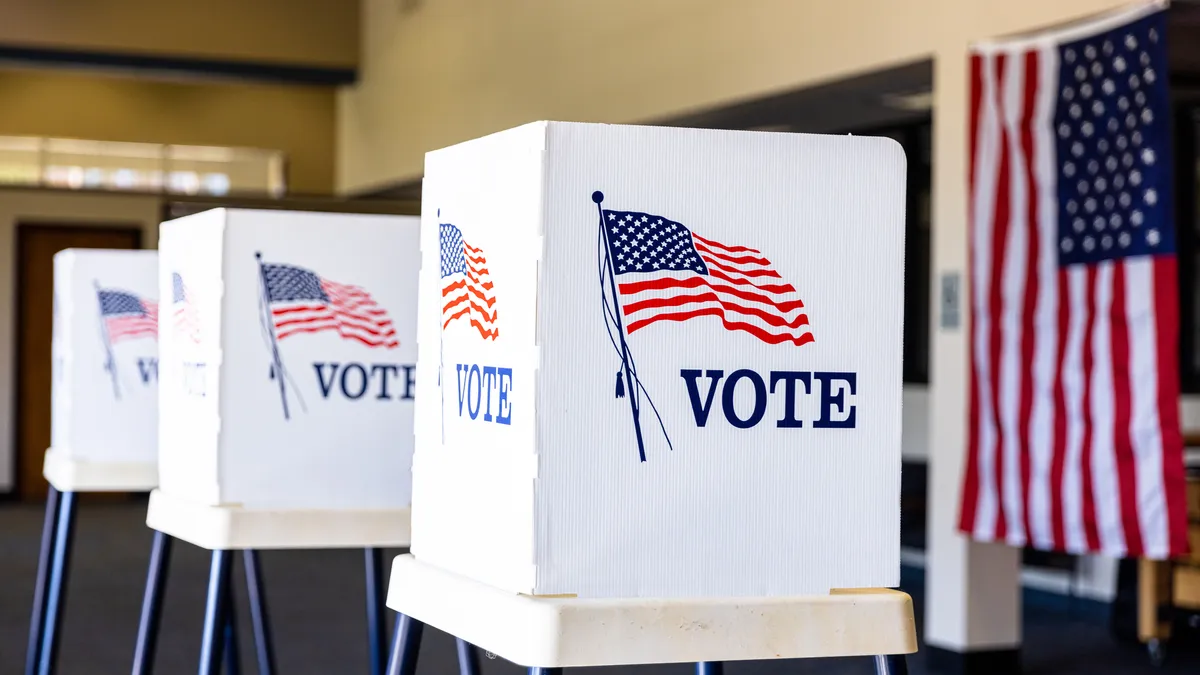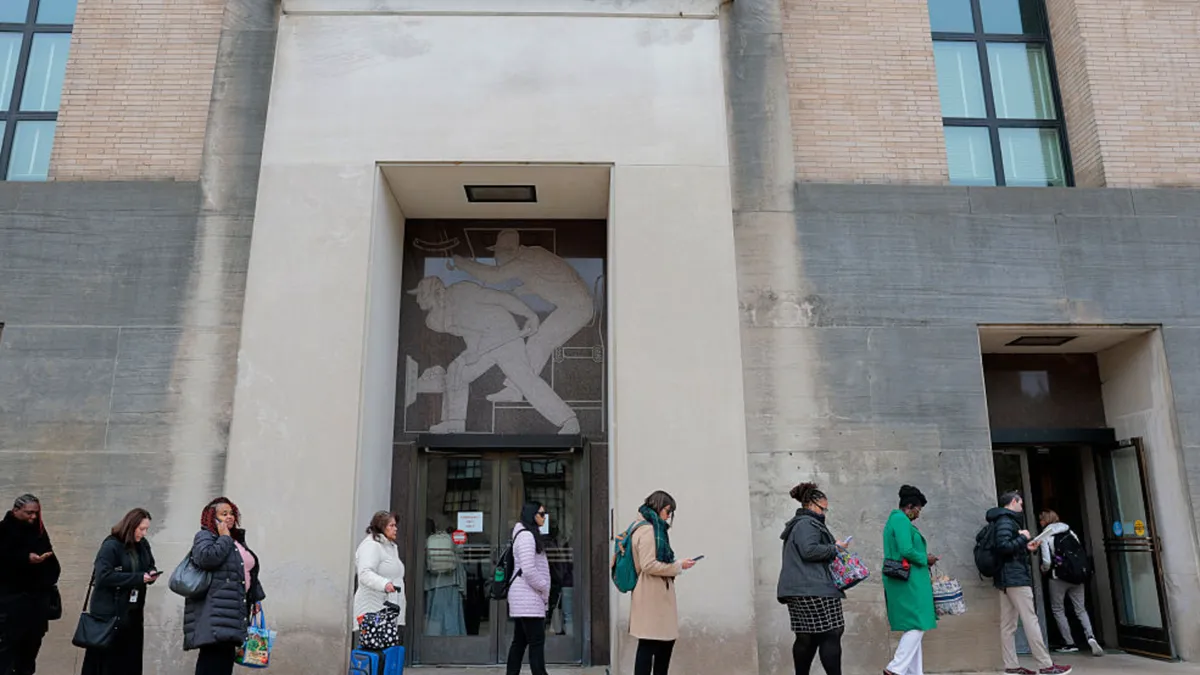Congress and a slew of state legislatures could be in for major shake-ups next year depending on the results of Tuesday’s midterm elections.
But with drug pricing reforms already enacted through the Inflation Reduction Act and a Democratic administration in office for another two years, pharma hasn’t been as invested in this round of elections as in past midterms. Industry companies and lobbying groups shelled out about $281 million this year, down from more than $337 million, factoring inflation, during the 2018 election cycle.
However, the results could have major ramifications for pharma and other life science players, according to analysts. Ahead of the vote, we’re looking at potential policy outcomes if Republicans take control of one — or both — chambers of Congress.
Drug pricing tweaks
A complete repeal of the Inflation Reduction Act’s drug pricing measures is unlikely even if Republicans do take control of Congress, Ian Spatz, a senior adviser at Manatt, Phelps & Phillips and former vice president for global health policy at Merck and Co., said. But he added that the industry can expect to see “changes around the edges” of the policy.
While any repeal efforts would suffer a near-certain veto under President Joe Biden, Republicans will be able to use the power of congressional oversight to sway the Center for Medicare and Medicaid Service’s implementation of the policy, Spatz said.
This is most likely to occur in the form of congressional hearings by the House Energy and Commerce Committee, which is likely to be led by Rep. Cathy McMorris Rodgers (R-Wash.), the top recipient of pharma campaign dollars this cycle (totaling $551,590), if Republicans take control of the chamber. Rodgers has already reportedly drafted a list of oversight hearings she plans to hold, which includes a probe into how CMS Administrator Chiquita Brooks-LaSure implements Medicare drug pricing negotiation policies.
Although Spatz said he doesn’t expect major changes to the drug policy, partially because of its positive impact on the federal budget, Republicans could make reforms to the redesign of the Part D coverage gap, which caps out-of-pocket costs for consumers and could look to influence how drug negotiation measures are implemented.
Heather Meade, a healthcare principal at Washington Council Ernst & Young said pharmas can also “expect Republicans to focus (oversight) heavily on the Administration’s COVID-19 response ... the increase in fentanyl and overdose deaths, medical supply chain issues, and the Federal Trade Commission’s approach to health care consolidation.” She also suggested Republicans could look to enhance the FDA’s Accelerated Approval Program and may look to incentivize domestic manufacturing.
These changes could be positive for the pharma industry, Spatz said. However, he also warned that “this isn’t your grandmother’s Republican Party,” noting that many candidates in the GOP are running on populist anti-business platforms, and anything is on the table.
Pharma-friendly insulin reform
The IRA capped insulin costs at $35 a month for Medicare beneficiaries and a bipartisan effort led by Sens. Jeanne Shaheen (D-NH) and Susan Collins (R-Maine) since the bill’s passage has sought to expand that provision to the commercial market. The measure still could pass in a planned year-end bill, but Meade said the policies attached to that package “will depend on the post-election dynamics and other top-of-mind issues that may make everything else take a back seat, such as the possibility of raising the debt ceiling.” If insulin reforms don’t make the cut, analysts believe they will get a revamp in a Republican-led Congress.

“In a scenario where the Republicans take control of the House and the Senate, the Shaheen-Collins bill would look meaningfully different because they have been trying to craft that along bipartisan lines,” Ryan Urgo, managing director of health policy at Avalere Health said, adding that “the notion of getting a reduction to insulin list prices” would remain of bipartisan interest
Cathy Kelly, an analyst at Citeline, echoed that sentiment, arguing that “if Republicans do get behind something, it would probably go easy on manufacturers.”
The current Shaheen-Collins bill requires drugmakers to reduce the list price for insulin back to 2021 levels and prohibits manufacturer rebates, which are typically negotiated with pharmacy benefit managers. The Pharmaceutical Care Management Association, the lobbying group representing PBMs, has opposed the bill but the Pharmaceutical Research and Manufacturers of America (PhRMA) so far has not taken a stance.
Pharmacy benefit managers in trouble
A new Republican-led Congress, or a split legislature, doesn’t bode well for the pharma-payer middlemen.
Rep. James Comer (R-Ky.), who could lead the House Oversight and Reform Committee if his party wins the chamber, has long derided PMBs for what he says is their role in the rising cost of prescription drugs and published a 2021 report which found that their practices “hurt competition and distort the marketplace.” In a statement to The Washington Post, Comer said holding PBMs to greater accountability would be a major part of his agenda as chair of the Oversight Committee.
"This isn’t your grandmother’s Republican Party.”

Ian Spatz
Senior adviser, Manatt, Phelps & Phillips
On the other side of the Capitol building, Sen. Chuck Grassley, the ranking member of the Senate Judiciary Committee, has pressed the Federal Trade Commission (FTC) to complete its investigation into PBM practices, which began in June. A Republican majority in the Senate would give Grassley increased power and oversight both into the FTC investigation and PBM practices in general.
Democrats are no friends to PBMs, either. Over the past two years, the party has repeatedly tried to pass a measure requiring the public disclosure of prices negotiated by the middlemen. It’s safe to say that however the election shakes out, PBMs are on the bipartisan hunting ground.



















